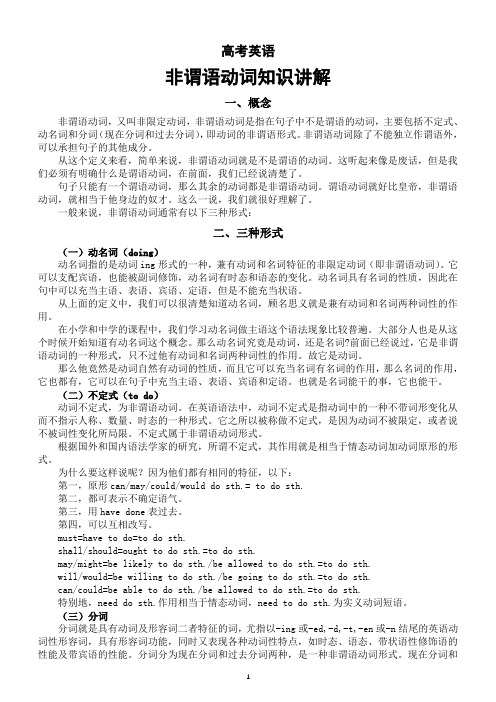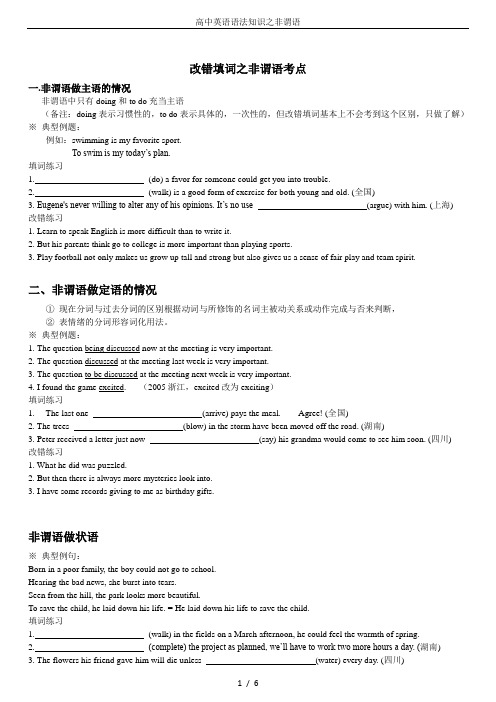高中英语语法知识之非谓语
高中英语语法总结-非谓语动词

非谓语动词在句中充当除谓语以外的句子成分的动词形式叫做非谓语动词。
非谓语动词分为三种形式:不定式、动名词和分词(分词包括现在分词和过去分词)不定式一、不定式的作用1、作主语不定式作主语时,谓语用单数。
往往用it 作形式主语,把不定式放在谓语后面。
如:Ittookus two hoursto finish the job.It is impossible for usto get there on time.It is very kind ofyou to help us.注意:(1)其他系动词如look, appear等也可用于此句型。
(2)当不定式作主语的句子中又有一个不定式作表语时,不能用It is…to…的句型。
试比较:Itis tonegate my ownidea to believe him.(错)To believe himis to negatemyown idea .(对)(3)It is+ adj.of /for sb. todosth. 结构中,当不定式的逻辑主语和前面的形容词可以构成系表结构时,用of, 否则用for.2、作宾语(1)动词+不定式。
如:He managedto escape fromthe fire.I find it hard to getalongwithhim.(it 作形式宾语)注:下列动词通常用不定式作宾语:want,try, hope, wish,need, forget,know,promise, refuse, help, decide,begin,start,learn,agree,choose, get等(2)动词+疑问词+to , “特殊疑问句+不定式”相当于名词,作宾语。
如:I don’tknow what to do next/ howtodo it next.I can’tdecide whentogo there.注意:不定式短语作宾语时,如果还带有宾语补足语,往往把不定式短语放在宾语补足语之后,用it 作形式宾语。
高考英语重难点语法讲解 非谓语动词

高考英语重难点语法讲解非谓语动词高考英语重难点语法讲解-非谓语动词高中语法——非限定动词一、非谓语动词种类在英语中,不充当句子谓语但具有除谓语以外的其他语法功能的动词称为非谓语动词。
非限定动词有动词不定式(theinfinitive);动名词(thegerund);现在分词(thepresentparticiple);过去分词(thepastparticiple)。
二、分类:(1)不定式的形式:主动被动一般式towritetobewritten进行式tobewriting/完成式tohavewrittentohavebeenwritten否定式not+(to)do1)一般式:不定式的一般式所表示的动作与谓语动词动作同时发生或发生在谓语动词动作之后,例如:i’mgladtomeetyou.heseemstoknowalot.weplantopayavisit.hewantstobeanartist.患者要求进行一次手术。
theteacherorderedtheworktobedone.2)进行式:不定式的进行式所代表的动作与谓语动词的动作同时发生,例如:男孩继续努力工作heseemstobereadinginhisroom.3)完成式:不定式的完成式表示动作发生在谓语动词的动作之前,例如:iregrettedtohave toldalieihappenedtohaveseenthefilm.heispleasedtohavemethisfriend.(2)动名词的形式:voice 1式一般式完成式否定式1)一般式:主动语态“什么都没做”+动名词被动语态“被看见”就是“看见”就是“相信”。
2)被动式:他没被邀请就去了派对。
他没有被邀请就来参加聚会了。
3)完成式:我们记得看过这部电影。
我们记得看过这部电影。
4)完成被动式:他在五年前卖掉了肯托广州的啤酒。
他忘了五岁时被带到广州。
5)否定:不+动名词iregretnotfollowinghisadvice.我后悔没听他的劝告。
高中英语语法非谓语动词

非谓语动词一、动词的-ed形式1.动词-ed形式作状语(1)动词-ed形式作状语,进一步说明谓语动词的动作或状态,其逻辑主语通常就是句子的主语。
Used with care, one tin will last for six weeks.Translated into English, the sentence was found to have an entirely different word order.(2)某些动词的过去分词已经形容词化,此时这些过去分词表示一种状态。
这样的词(组)常见的有:lost (迷路的), seated (坐), hidden (躲), stationed (驻扎), lost/absorbed in (沉溺于), dressed in (穿着), tired of (感到厌倦)等。
Absorbed in his book, he didn’t notice me enter the room.2.动词-ed形式作定语动词-ed形式(短语)作定语与它所修饰的名词之间在逻辑上存在被动关系,并表示该动作的被动或完成。
Tsinghua University, founded in 1911, is home to a great number of outstanding figures.3.动词-ed形式作宾语补足语动词-ed形式作宾语补足语时,句中的宾语往往就是其逻辑主语,该动词与宾语之间存在动宾关系。
Michael put up a picture of Yao Ming beside the bed to keep himself reminded of his own dreams.4.动词-ed形式作表语动词-ed形式作表语时,大多数是已经形容词化的过去分词。
如:seated, disappointed, stuck, excited等。
In April, thousands of holidaymakers remained stuck abroad due to the volcanic ash cloud.二、动词的-ing形式1.动词-ing形式作状语(1)动词的-ing形式作状语表示在进行一动作的同时所进行的另一动作,它对谓语动词起修饰和陪衬的作用。
高中英语语法非谓语动词讲解

高中英语语法非谓语动词讲解非谓语动词是英语中的一种特殊动词形式,它们可以在句子中作名词、形容词或副词的作用。
高中英语语法中,非谓语动词主要分为不定式、动名词和分词三种形式。
1. 不定式不定式由“to + 动词原形”构成,如:to go、to study。
不定式在句子中可以作主语、宾语、表语、定语或状语。
1.1 作主语不定式作主语时,句子用“it + be + 不定式”结构,如:It is important to learn English well.1.2 作宾语不定式作宾语时,常跟在及物动词后面,如:I want to play soccer.1.3 作表语1.4 作定语不定式作定语时,修饰名词或代词,如:a book to read.1.5 作状语不定式作状语时,表示目的、结果、原因等,如:He came here to see his friend.2. 动名词动名词是由动词加-ing构成的名词,如:playing、studying。
动名词在句子中可以作主语、宾语、表语、定语或状语。
2.1 作主语动名词作主语时,常用单数形式,如:Swimming is good for health.2.2 作宾语动名词作宾语时,常跟在及物动词后面,如:I enjoy playing basketball.2.3 作表语动名词作表语时,句子用“主语 + be + 动名词”结构,如:His hobby is swimming.2.4 作定语2.5 作状语动名词作状语时,表示方式、时间、原因等,如:He made money by working hard.3. 分词分词是由动词的变化形式构成的形容词,常分为现在分词和过去分词两种形式。
分词在句子中可以作定语、表语或状语。
3.1 现在分词作定语现在分词作定语时,修饰名词或代词,如:a crying baby.3.2 过去分词作定语过去分词作定语时,修饰名词或代词,如:a broken window.3.3 分词作表语分词作表语时,句子用“主语 + be + 分词”结构,如:He is tired.3.4 分词作状语分词作状语时,表示时间、原因、条件等,如:Walking slowly, he reached the destination.以上是高中英语语法非谓语动词的讲解,希望对你有所帮助。
高中英语高考复习非谓语动词知识讲解

高考英语非谓语动词知识讲解一、概念非谓语动词,又叫非限定动词,非谓语动词是指在句子中不是谓语的动词,主要包括不定式、动名词和分词(现在分词和过去分词),即动词的非谓语形式。
非谓语动词除了不能独立作谓语外,可以承担句子的其他成分。
从这个定义来看,简单来说,非谓语动词就是不是谓语的动词。
这听起来像是废话,但是我们必须有明确什么是谓语动词,在前面,我们已经说清楚了。
句子只能有一个谓语动词,那么其余的动词都是非谓语动词。
谓语动词就好比皇帝,非谓语动词,就相当于他身边的奴才。
这么一说,我们就很好理解了。
一般来说,非谓语动词通常有以下三种形式:二、三种形式(一)动名词(doing)动名词指的是动词ing形式的一种,兼有动词和名词特征的非限定动词(即非谓语动词)。
它可以支配宾语,也能被副词修饰,动名词有时态和语态的变化。
动名词具有名词的性质,因此在句中可以充当主语、表语、宾语、定语,但是不能充当状语。
从上面的定义中,我们可以很清楚知道动名词,顾名思义就是兼有动词和名词两种词性的作用。
在小学和中学的课程中,我们学习动名词做主语这个语法现象比较普遍。
大部分人也是从这个时候开始知道有动名词这个概念。
那么动名词究竟是动词,还是名词?前面已经说过,它是非谓语动词的一种形式,只不过他有动词和名词两种词性的作用。
故它是动词。
那么他竟然是动词自然有动词的性质,而且它可以充当名词有名词的作用,那么名词的作用,它也都有,它可以在句子中充当主语、表语、宾语和定语。
也就是名词能干的事,它也能干。
(二)不定式(to do)动词不定式,为非谓语动词。
在英语语法中,动词不定式是指动词中的一种不带词形变化从而不指示人称、数量、时态的一种形式。
它之所以被称做不定式,是因为动词不被限定,或者说不被词性变化所局限。
不定式属于非谓语动词形式。
根据国外和国内语法学家的研究,所谓不定式,其作用就是相当于情态动词加动词原形的形式。
为什么要这样说呢?因为他们都有相同的特征,以下:第一,原形can/may/could/would do sth.= to do sth.第二,都可表示不确定语气。
高中英语语法重点复习之非谓语动词

高中英语语法重点复习之非谓语动词非谓语动词是英语语法中的重要部分,它们在句子中起到了多种不同的作用。
在高中英语学习中,我们经常需要掌握非谓语动词的用法和结构。
本文将重点介绍非谓语动词的几种形式和用法,并通过示例进行说明。
一、不定式不定式是非谓语动词中最常见的一种形式。
它的结构为“to + 动词原形”,可以用作名词、形容词和副词。
下面是一些常见的不定式用法:1. 作主语:To learn English well is important for students.2. 作宾语:I want to go shopping this afternoon.3. 作表语:His dream is to become a doctor.4. 作定语:He has a lot of books to read.5. 作状语:She came here to see her friend.不定式还有一些特殊的用法,如不定式的完成式和被动式等。
例如:1. 完成式:I am glad to have finished my homework.2. 被动式:The book is easy to be understood by children.二、动名词动名词是以-ing结尾的动词形式,可以作名词、形容词和副词。
下面是一些常见的动名词用法:1. 作主语:Swimming is good for health.2. 作宾语:I enjoy reading books in my free time.3. 作表语:Her hobby is singing and dancing.4. 作定语:I bought a writing desk for my study.5. 作状语:He left the room, slamming the door behind him.动名词还可以与一些特定的动词搭配使用,如avoid, consider, enjoy, finish等。
高中英语语法非谓语动词详解

高中英语语法非谓语动词详解高中英语语法非谓语动词详解在高级英语语法中,非谓语动词是非常重要的一部分,也是理解和掌握英语语法的关键。
非谓语动词在句子中扮演着重要的角色,可以表达不同的意思和功能。
本文将详细解释非谓语动词的定义、类型和用法,并通过实例进行分析和解释。
一、定义和类型非谓语动词指的是在句子中不作为主要动词的动词形式,它们可以表达动词本身的含义,但没有主语和谓语动词。
非谓语动词包括动词不定式、动名词和分词三种类型。
1、动词不定式:动词不定式是以“to+”动词原形构成的,表示动词的不同形式,如“to do”、“to being”、“to have done”等。
2、动名词:动名词是在动词后加上“-ing”构成的,表示动词的现在分词形式,如“playing”、“swimming”、“jumping”等。
3、分词:分词是动词的过去分词形式,分为现在分词和过去分词两种。
现在分词表示动词的动作正在进行,如“running”、“singing”、“dancing”等;过去分词表示动词的动作已经完成,如“finished”、“eaten”、“read”等。
二、非谓语动词的用法非谓语动词在句子中可以扮演不同的成分,如主语、宾语、状语等。
下面我们通过具体的例子来分析非谓语动词的用法:1、动词不定式:在句子中,动词不定式可以作为主语、宾语和状语等。
例如,“To learn English is important”(学习英语很重要)中,动词不定式“to learn English”作为主语;或者在“I want to go home”(我想回家)中,动词不定式“to go home”作为宾语。
2、动名词:在句子中,动名词可以作为主语、宾语和状语等。
例如,“Playing sports is fun”(做运动很有趣)中,动名词“Playing sports”作为主语;或者在“I enjoy listening to music”(我喜欢听音乐)中,动名词“listening to music”作为宾语。
高中英语语法知识之非谓语

改错填词之非谓语考点一.非谓语做主语的情况非谓语中只有doing和to do充当主语(备注:doing表示习惯性的,to do表示具体的,一次性的,但改错填词基本上不会考到这个区别,只做了解)※典型例题:例如:swimming is my favorite sport.To swim is my today’s plan.填词练习1. (do) a favor for someone could get you into trouble.2. (walk) is a good form of exercise for both young and old. (全国)3. Eugene's never willing to alter any of his opinions. It’s no use (argue) with him. (上海)改错练习1. Learn to speak English is more difficult than to write it.2. But his parents think go to college is more important than playing sports.3. Play football not only makes us grow up tall and strong but also gives us a sense of fair play and team spirit.二、非谓语做定语的情况①现在分词与过去分词的区别根据动词与所修饰的名词主被动关系或动作完成与否来判断,②表情绪的分词形容词化用法。
※典型例题:1. The question being discussed now at the meeting is very important.2. The question discussed at the meeting last week is very important.3. The question to be discussed at the meeting next week is very important.4. I found the game excited. (2005浙江,excited改为exciting)填词练习1. ---The last one (arrive) pays the meal. ---Agree! (全国)2. The trees (blow) in the storm have been moved off the road. (湖南)3. Peter received a letter just now (say) his grandma would come to see him soon. (四川)改错练习1. What he did was puzzled.2. But then there is always more mysteries look into.3. I have some records giving to me as birthday gifts.非谓语做状语※典型例句:Born in a poor family, the boy could not go to school.Hearing the bad news, she burst into tears.Seen from the hill, the park looks more beautiful.To save the child, he laid down his life. = He laid down his life to save the child.填词练习1. (walk) in the fields on a March afternoon, he could feel the warmth of spring.2. (complete) the project as planned, we’ll have to work two more hours a day. (湖南)3. The flowers his friend gave him will die unless (water) every day. (四川)改错练习1. Following by the officers, the general inspected the army.2. My parents love me dearly of course and will do all they can make sure that I get a good education.3. Shake her head, she said, “It isn‘t a good time to do that, dear.”三.非谓语做宾语①特殊动词+doing / to do做宾语※典型例句:1. I suggest doing it in a different way.2. They didn't mind being treated like guests.3. I hope to see you again.4. He chooses to study abroad.填词练习1. It was silly of you (believe) what he said.2. --- Can I smoke here? ---Sorry. We don’t allow(smoke) here.3. David and I wanted (go) off to find help but Bill insisted on staying near the car.4. It is difficult to imagine his (accept) the decision without any consideration.5. Susan wanted to be independent. So she tried (live) alone, but she didn’t like it and moved back home.6. If you think that treating a woman well means always (get) her permission for things, think again. 改错练习1. It’s very difficult for a foreigner learn Chinese.2. The film is very interesting. It is worth see twice.3. I waved to her but failed attract her attention.4. In those days we were forced work twelve hours a day.5. I had always wanted return to the village after moving away.6. Soon I began to enjoy talk to myself on paper as I was learning to express myself in simple English.7. Look, some of my classmates are practicing speak English over there.②介词+doing , 但是but / except +to do※典型例句:1. You will have to pay the cost of sending a postcard.2. I want to thank you again for having me in your home for the summer holidays.3. The teacher made no comments except to tell him to work hard.4. He had no choice but to sit there as usual.填词练习1. Did you have trouble in (find) the post office?2. I believe that’s the best way to prevent such a thing from(happen) again.3. Sandy could do nothing but (admit) to his teacher that he was wrong.4. According to a recent U.S. survey, children spend up to 25 hours a week (watch) TV.改错练习1. The lost child desired nothing but going home.2. After learn the basics of the subject, nothing else seemed very practical to me.3. It’s like going to a huge library without have to walk around to find your books.4. I dream of standing on the platform in the classroom and give lessons to lovely boys and girls.五.非谓语做宾补①感官动词后的非谓语宾补形式②使役动词后的非谓语宾补形式③特殊动词后的非谓语宾补形式(Vt.+sb. +to do )例:I heard them sing yesterday. 昨天我听见他们唱歌了。
- 1、下载文档前请自行甄别文档内容的完整性,平台不提供额外的编辑、内容补充、找答案等附加服务。
- 2、"仅部分预览"的文档,不可在线预览部分如存在完整性等问题,可反馈申请退款(可完整预览的文档不适用该条件!)。
- 3、如文档侵犯您的权益,请联系客服反馈,我们会尽快为您处理(人工客服工作时间:9:00-18:30)。
改错填词之非谓语考点一.非谓语做主语的情况非谓语中只有doing和to do充当主语(备注:doing表示习惯性的,to do表示具体的,一次性的,但改错填词基本上不会考到这个区别,只做了解)※典型例题:例如:swimming is my favorite sport.To swim is my today’s plan.填词练习1. (do) a favor for someone could get you into trouble.2. (walk) is a good form of exercise for both young and old. (全国)3. Eugene's never willing to alter any of his opinions. It’s no use (argue) with him. (上海)改错练习1. Learn to speak English is more difficult than to write it.2. But his parents think go to college is more important than playing sports.3. Play football not only makes us grow up tall and strong but also gives us a sense of fair play and team spirit.二、非谓语做定语的情况①现在分词与过去分词的区别根据动词与所修饰的名词主被动关系或动作完成与否来判断,②表情绪的分词形容词化用法。
※典型例题:1. The question being discussed now at the meeting is very important.2. The question discussed at the meeting last week is very important.3. The question to be discussed at the meeting next week is very important.4. I found the game excited. (2005浙江,excited改为exciting)填词练习1. ---The last one (arrive) pays the meal. ---Agree! (全国)2. The trees (blow) in the storm have been moved off the road. (湖南)3. Peter received a letter just now (say) his grandma would come to see him soon. (四川)改错练习1. What he did was puzzled.2. But then there is always more mysteries look into.3. I have some records giving to me as birthday gifts.非谓语做状语※典型例句:Born in a poor family, the boy could not go to school.Hearing the bad news, she burst into tears.Seen from the hill, the park looks more beautiful.To save the child, he laid down his life. = He laid down his life to save the child.填词练习1. (walk) in the fields on a March afternoon, he could feel the warmth of spring.2. (complete) the project as planned, we’ll have to work two more hours a day. (湖南)3. The flowers his friend gave him will die unless (water) every day. (四川)改错练习1. Following by the officers, the general inspected the army.2. My parents love me dearly of course and will do all they can make sure that I get a good education.3. Shake her head, she said, “It isn‘t a good time to do that, dear.”三.非谓语做宾语①特殊动词+doing / to do做宾语※典型例句:1. I suggest doing it in a different way.2. They didn't mind being treated like guests.3. I hope to see you again.4. He chooses to study abroad.填词练习1. It was silly of you (believe) what he said.2. --- Can I smoke here? ---Sorry. We don’t allow(smoke) here.3. David and I wanted (go) off to find help but Bill insisted on staying near the car.4. It is difficult to imagine his (accept) the decision without any consideration.5. Susan wanted to be independent. So she tried (live) alone, but she didn’t like it and moved back home.6. If you think that treating a woman well means always (get) her permission for things, think again. 改错练习1. It’s very difficult for a foreigner learn Chinese.2. The film is very interesting. It is worth see twice.3. I waved to her but failed attract her attention.4. In those days we were forced work twelve hours a day.5. I had always wanted return to the village after moving away.6. Soon I began to enjoy talk to myself on paper as I was learning to express myself in simple English.7. Look, some of my classmates are practicing speak English over there.②介词+doing , 但是but / except +to do※典型例句:1. You will have to pay the cost of sending a postcard.2. I want to thank you again for having me in your home for the summer holidays.3. The teacher made no comments except to tell him to work hard.4. He had no choice but to sit there as usual.填词练习1. Did you have trouble in (find) the post office?2. I believe that’s the best way to prevent such a thing from(happen) again.3. Sandy could do nothing but (admit) to his teacher that he was wrong.4. According to a recent U.S. survey, children spend up to 25 hours a week (watch) TV.改错练习1. The lost child desired nothing but going home.2. After learn the basics of the subject, nothing else seemed very practical to me.3. It’s like going to a huge library without have to walk around to find your books.4. I dream of standing on the platform in the classroom and give lessons to lovely boys and girls.五.非谓语做宾补①感官动词后的非谓语宾补形式②使役动词后的非谓语宾补形式③特殊动词后的非谓语宾补形式(Vt.+sb. +to do )例:I heard them sing yesterday. 昨天我听见他们唱歌了。
I heard the children shouting upstairs. 我们听见孩子们在楼上叫喊。
I heard the Ninth Symphony played last night. 昨晚我听了第九交响乐的演奏。
He made/had me laugh. = He gets me to laugh.= He leaves me to laugh.The boss got/left/ had employees working all the time.Can you make/have/get the work finished in time?She asked me to answer the phone in her absence. 她请我在她不在的时候接电话。
